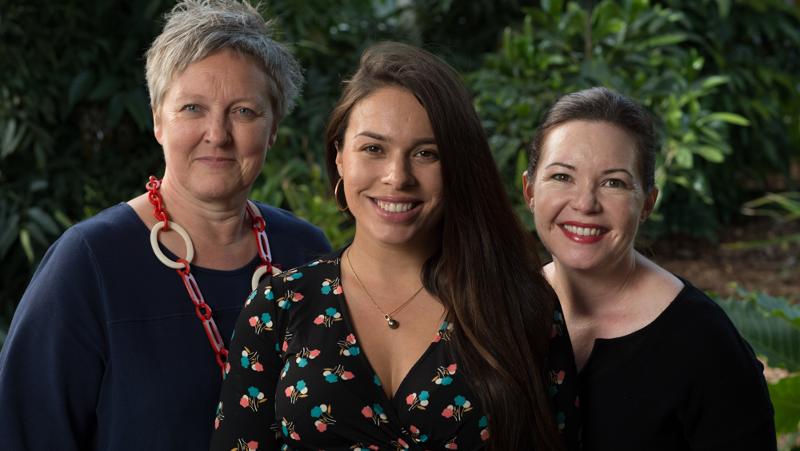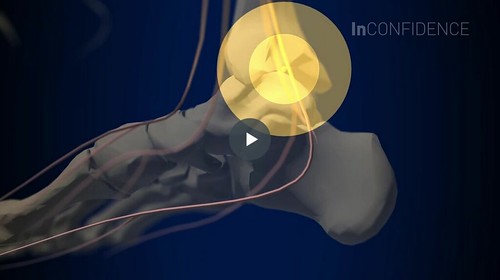
A fashionable pair of earrings for women with gestational diabetes that automatically monitors and helps control blood glucose levels and a device to help brain to bladder function among geriatric patients are among the newest medical innovations being built in Brisbane.
The ideas were sparked during an intensive week-long course held at QUT which attracted 118 entrepreneurial thinkers from around the globe.
Tasked to find novel solutions to some of the world’s biggest global problems, the top two teams were chosen for their solutions to the most personal of medical problems.
Participants of the MIT Global Entrepreneurship Bootcamp at Gardens Point campus in March were selected from more than 6,000 applicants across the world to transform their innovative ideas into burgeoning businesses.
They were put through the rigours of a one-year MIT course, condensed into a seven-day action-based learning experience, led by entrepreneur-turned-educator Bill Aulet (pictured centre below) and author of Disciplined Entrepreneurship.
Brisbane women Tamara Mills and QUT’s alumni Nyree McKenzie and Lee Brentzell were among the top two teams, selected to pitch their ideas to an international panel of venture capitalists from Brisbane, San Francisco and Boston.
Ms Mills is a second-time gestational diabetic who has a MedTech commercialisation background and joined Jean Hausser from Israel, Abhishek Appaji from India, Brendan Barbato from the US and Coutney Condren from Australia to form a team called EZBT during the MIT Bootcamp.
The team shared experience in diabetes research and development, biomedical engineering and artificial intelligence computational bioscience.
“One in ten pregnant women will be diagnosed with gestational diabetes and one in three babies born to women with gestational diabetes have complications such as being born abnormally large with high risk of developing diabetes later in life,” Ms Mills said.
Ms Mills said up to 60 per cent of women with gestational diabetes do not comply with regular self-monitoring requirements and diet control recommendations and this can have significant implications on the health of the mother and baby.
She said the cost of complications as a result of gestational diabetes in the US is estimated higher than $2 billion per annum and rising.
“We are developing a non-invasive wearable device, a fashionable pair of earrings that not only continuously monitors blood glucose levels without needles and without hassle, but leverages deep machine learning to predict blood glucose response to foods before being eaten, helping mothers minimise complications for themselves and their babies,” she said.
The team filed a provisional patent on the non-invasive blood glucose measurement technology alongside building the working prototype due to be complete in July this year.
"We have had significant interest expressed by healthcare providers and insurance companies across Australia and the US and are actively seeking investment for full commercial development of the technology," Ms Mills said.
“It was an honour to be named winners of the MIT Bootcamp but we didn’t set out to win but to learn as much as possible about disciplined entrepreneurship and build the foundations of a company that can improve the lives of mothers with gestational diabetes.
The all-Australian second place finalists, named InConfidence, drew upon their combined clinical, medical technology and commercial backgrounds to pitch a solution that addresses a widespread problem facing Australia’s aging population.
Ms McKenzie (pictured right) said 70 per cent of people living in residential aged care suffer from urinary and/or faecal incontinence with conventional treatments largely unsuitable due to negative side effects and invasiveness of surgical procedures.
“These treatments combined with the more prevalent conservative solutions such as adult nappies lead to a loss of dignity, reduced independence and social isolation for incontinence sufferers,” Ms McKenzie said.
“Our solution overcomes the problem with a discrete, non-invasive wearable device that has minimal side effects.”
She said a functional prototype had been developed which acts to normalise the neural communication between the bladder/bowel and the brain to restore correct function.
Watch video below:
Since their debut at QUT the teams have committed to formalising their entrepreneurship journey together.
Ms McKenzie said InConfidence had received interest from healthcare providers and will present the technology to the NSW Department of Health and to Cicada Innovations, Australia’s leading deep technology incubator, for prospective funding.
“We realised that our team is stronger together, and so we’ve also become each other’s Board of Advisors to keep us all accountable and driven to see our ideas through to market commercialisation,” she said.
Professor Rowena Barrett, Head of the School of Management at QUT, said the MIT Bootcamp helped build Brisbane as a global hub of innovation and entrepreneurship.
“Entrepreneurship is a skill that is being taught. QUT is developing graduates who can choose to be entrepreneurs in applying their discipline skills and knowledge to solve future global challenges,” Professor Barrett said.
Advance Queensland partnered with QUT to bring the MIT Bootcamp to Australia.
Media contacts:
Debra Nowland, QUT Media, 07 3138 1150 (Mon/Wed/Thurs) or media@qut.edu.au
After hours: Rose Trapnell, 0407 585 901


